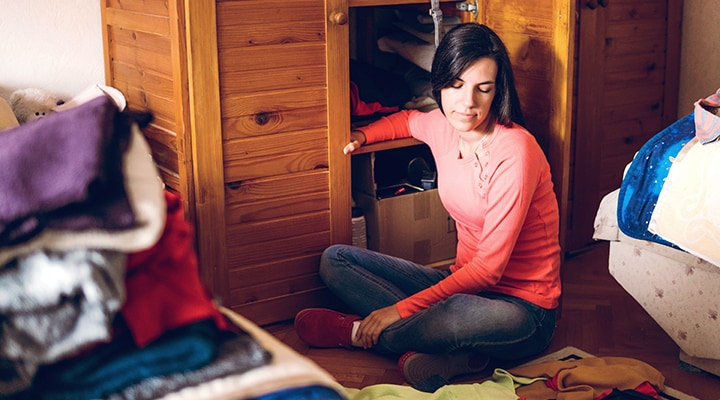How decluttering improves your life (and tips to get started)
As a nation, we’ve taken on the decluttering trend with gusto, finally tackling overflowing kitchen cupboards and freeing our homes of unused items. While many Aussies now live a minimalist lifestyle, charity shops have reported a dramatic increase in donations. So where has this newfound passion come from?
It’s mostly thanks to decluttering queen Marie Kondo, whose Netflix show and bestselling book encourage people to throw out anything that doesn’t “spark joy”.
“Clutter is something many people struggle with,” says Dr Alice Boyes, author of The Anxiety Toolkit and The Healthy Mind Toolkit. In addition to wanting a more orderly home, she says, “decluttering is also a practical strategy people can use when they’re seeking a sense of control. Since there’s a lot of change in the world, that’s something people crave.”
So aside from being able to finally match all your socks, is there evidence that decluttering has health benefits?

How clutter affects your mental health
There's some evidence that physical clutter can negatively impact on our emotions and general wellbeing. Research published in the journal Current Psychology found a direct link between procrastination and clutter.
The researchers surveyed university students, young adults in their 20s and 30s, and older adults, mostly in their 50s. They found procrastination contributed to clutter across all three age groups and, among older adults, it led to a significant decrease in life satisfaction. In another study, from Princeton University in the US, researchers found physical clutter negatively affects the ability to focus and process information.
Dr Boyes says organising our spaces can benefit our mental health and processing capabilities, as it “requires our brains to plan, order, sequence, make decisions, overcome anxiety about decisions and overcome procrastination”. She says it can also increase confidence. “People can feel held back by their mess. Long-term mess often reflects our past selves, so decluttering can make us feel we have a fresh start, which can be energising.”
In contrast, living in a cluttered environment can increase stress and anxiety. A study from the University of California looked at this in dual-income married couples. It found that women who felt their homes were cluttered had higher levels of the stress hormone cortisol through the day. Most of the men, who didn’t feel their homes were cluttered, had cortisol levels that dropped in the day.
A St Lawrence University study found people who hoard objects tend to have worse sleep than those who don’t.
The thought of decluttering can be overwhelming or stressful. Start small, with objects that don’t have sentimental meaning. And if you’re keeping items “just in case you need them”, ask yourself when you last used them and how likely you are to use them in the future.
Cleaning your house can be good exercise
Clutter can affect the body and the brain. Organising your space can be a good source of incidental exercise, which can play an important part in boosting fitness, reports the University of Sydney.
Dr Boyes says the physical activity of decluttering can also be energising for your brain. It encourages your thoughts to wander while you focus on the mundane task at hand. “Organising that involves some physical component can create ideal conditions for lightbulb moments and leaps of insight,” she adds.
Decluttering removes health hazards
Another benefit of decluttering is that it can keep dust and mould at bay, especially if you clean as you go. Dust mites are a significant allergen for many people and can live on clothing, especially when it’s tucked away in dark cupboards or drawers, according to the Allergy Unit at Sydney’s Royal Prince Alfred Hospital.
Mould can cause issues for people with asthma, allergies, other breathing conditions and weakened immune systems, and it can be found in cluttered storage areas.
Consider donating vs recycling
Before you head to your charity shop with your boxes of unwanted goods, check that everything is in decent condition. Australian op shops, often run by charities, are sending 60,000 tonnes of unwanted items to landfill each year.
You could also sell items online with Facebook marketplace, eBay or Gumtree. Or your extra stuff may be fit for recycling. Find out what you can recycle on Planet Ark’s Recycling Near You website.
Strike a balance
Some people aren’t bothered by clutter, so is mess always a bad thing? There’s some evidence that a certain amount of mess can encourage creativity. A management study in the US found participants in disorderly environments were more creative and more likely to break conventions.
The key, says Dr Boyes, is not to go overboard with decluttering or feel guilty if your home is messy. “Everyone has limited time and mental energy. Sometimes it makes sense to leave your mess while you prioritise other things.”
How to start tidying: 5 speedy decluttering tips
- Consider getting rid of things you haven’t used in a year.
- Don’t hold onto possessions out of guilt – for example, because it was a present.
- Designate just 10 minutes a day to your decluttering project if you feel overwhelmed by the very thought of it.
- Declutter by category, Marie Kondo style – start with clothes, then books, then papers, rather than going room by room.
- If you want to sort through a drawer or cupboard, take everything out of it first.
Words by Gina Flaxman
First published in the July 2019 issue of HCF’s Health Agenda magazine.
related articles
THE HEALTHY SIDE OF SILENCE
We explore the benefits of clearing your mind during quiet time.
THE BENEFITS OF GREEN SPACE
Walking in the park, swimming in the ocean and chasing waterfalls can all boost your overall health.
HOW TO MANAGE ANXIETY
Here’s what anxiety can feel like, and the treatments that may help.
THE SCIENCE BEHIND MOTIVATION
We discover where motivation lies in the brain, and how to activate it.